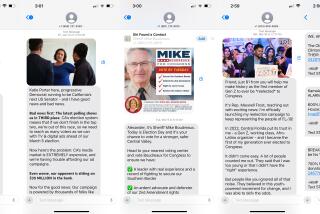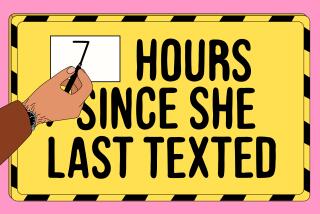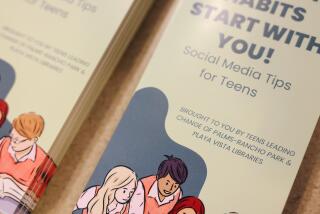Tailored text messages might help teens lose weight
- Share via
Teens love text messages--and those texts may help them lose weight, if they’re done right. A study tested out various types of weight management-themed text messages on overweight teens to see what they liked, finding that they favored positive messages but disliked thoughtful questions.
Overweight and obese teens can be a tough crowd when it comes to weight-loss interventions--many have a tough time adopting more healthful diet and exercise routines. Researchers from the University of Michigan thought tailored text messages might be a good way to help teens adopt lifestyle changes, since texts have been successful in helping others drop bad habits. The study appeared online recently in the journal Obesity.
To determine what kinds of text messages would be most effective the researchers set up four focus groups comprised of 24 male and female teens who were part of a weight management program. Six different message types were tested: testimonials, meal and recipe ideas, targeted tips, reflective questions, feedback questions and tailored messages.
Overall, the teens were excited about the text messages, but not everything passed muster. They liked messages that told them what to do, such as recipes and testimonials about weight-loss strategies--those the teens found encouraging, but only when they came from another teen.
Participants also liked positive, uplifting messages. Exclamations and emoticons were OK--especially for congratulating weight loss--but colloquialisms typically used by teens weren’t. “LOL,” for example, was not well received.
They also didn’t like mentions of unhealthful behaviors and foods, even if they were accompanied by references to healthier options. Mentioning unhealthful foods, for example, might trigger them to crave those items.
They weren’t crazy about reflective questions, especially when there were several in a row, such as, “What does being healthy mean for you? How does screen time fit in with your goals? How could cutting back on it help improve your health?” Teens thought there were too many and weren’t sure which to answer first. In discussions the teens said they wanted to be told what to do, instead of having to come up with their own weight-loss strategies.
That surprised the study authors, who noted that some studies find that people tend to stick with behavior changes if they’ve generated them more than if they come from other sources. But, they added, the delivery method may be to blame--a string of thoughtful questions may be too much to handle with a 140-character text messaging system.
The next step, said the authors, is to test the texts out on teens to see if they actually have any effect on weight loss.
More to Read
Eat your way across L.A.
Get our weekly Tasting Notes newsletter for reviews, news and more.
You may occasionally receive promotional content from the Los Angeles Times.










